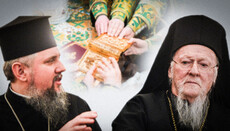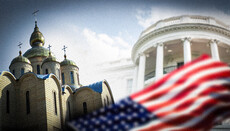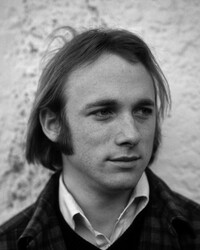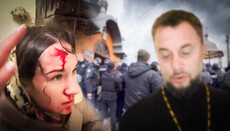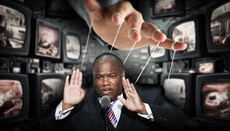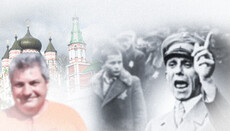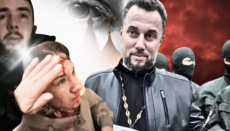"If we, Greeks, silence repressions against UOC, what Christians are we?"
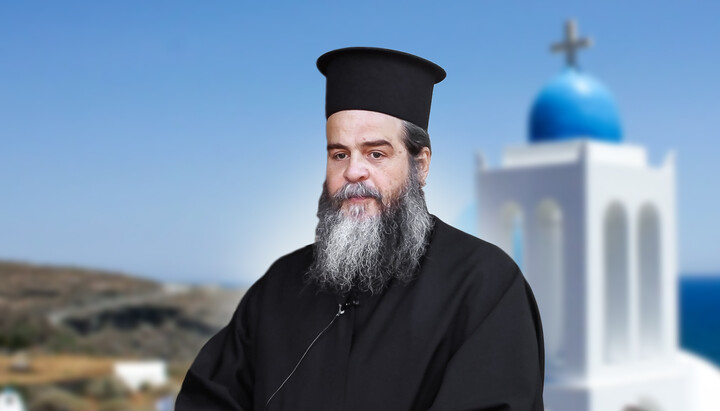
A Greek theologian spoke about the attitude to the persecution of the UOC, the OCU’s Tomos, the Pan-Orthodox Council and the canons on the remembrance of the patriarch.
The priest and theologian of the Metropolis of Patras of the Greek Church, Anastasios Gotsopoulos, is one of the few in the Greek world who raises his voice in defence of the true state of affairs in Ukraine. In 2022, he wrote a book entitled "A Contribution to the Dialogue on Ukrainian Autocephaly" in which he showed that "autocephaly" for the schismatic groups of Ukraine was a mistake, which not only did not lead to the healing of the schism but caused destructive processes in world Orthodoxy. Fr. Anastasios, in an extended video interview, told the UOJ how the Ukrainian situation looks from Greece today, whether the Greek Church is aware of the repression against the UOC, whether it is possible to hold the Pan-Orthodox Council without the head of the Phanar, how the 13th, 14th and 15th Canons of the First-Second Council on the commemoration of the patriarch are understood in Orthodoxy, and touched on many other topics that concern the Orthodox today.
– Father Anastasios, thank you for speaking with us, Orthodox believers of Ukraine. We have some questions. The first one is: What is the unity of the Church? How should it be understood, and in what way is it expressed? And to what extent does such unity imply administrative subordination?
– And I thank you, Father Tarasiy, for the special honour you grant me and the opportunity you provide to speak with you and through you to the Orthodox community of Ukraine, the faithful of the Ukrainian Church who are currently going through a difficult double temptation.
On the one hand, there is the war that Russia is waging on Ukrainian territory, the consequences of which are felt by all Orthodox countries. On the other hand, there is a temptation that may be even greater than the war. This is the division and schism, as well as the persecution that the UOC is undergoing from those who merely call themselves Orthodox Christians. I want you to convey my support and respect to His Beatitude Metropolitan Onuphry of Kyiv, the Holy Synod, and all the faithful of the Ukrainian Orthodox Church. We thank them for their martyrdom and testimony of faith.
Regarding the unity of the Church, we can say that it directly concerns Her very essence. One of the four features of the Church mentioned in the Creed is its unity. Why is the unity of the Church such a serious matter? Because the Church is Christ Himself. As the holy Fathers say, Christ continues to exist through time, through history, throughout the ages. The Apostle Paul and all theologians emphasize that the Church is the mystical Body, with Christ as its head and all of us believers as its members. From the beginning of the ages to the end of time.
Since there can only be one Body of Christ, with only one Head – Christ, the unity of the Church affects Her very existence. And Christ tells us that He is the Path, the Truth, and the Life. The Holy Spirit, who is the soul of the Body of Christ, is Himself called the Spirit of Truth by the Lord. The first sign of the unity of the Church is unity around the Truth. That is, the faith once imparted to the saints, as the Apostle Jude tells us, is the first distinguishing feature of the Church. All Orthodox Christians throughout the ages have had the same Orthodox faith. This apostolic teaching, the purity of which the fathers and saints of our Church preserved with much effort, even at the cost of their own lives.
The second element revealing the unity of our Church is worship. This unity is very well and symbolically depicted on the holy diskos during the Proskomedia at the Divine Liturgy. In the centre is Christ in the form of the Lamb, to His right – the Most Holy Theotokos, to His left – the angelic orders and all the saints, the triumphant, glorified Church, our Lord and all the saints. In front of the Triumphant Church on the diskos are portions for the dead and all of us, the living, who together with Christ constitute the Church Militant.
And in the portions commemorating the living, bishops of each Local Church occupy a prominent place. Thus, the portions on the diskos express the unity of the Church in both space and time. From the glorified saints of the Old Testament, anticipating the advent of the Messiah, to the end of the ages.
But for the Divine Liturgy to be celebrated, there must be the priesthood. In our Orthodox Church, not everyone can perform the worship, not anyone, but there are bishops and priests for this purpose. The priesthood, which you, I, our bishops, and priests have been honoured to bear, originates from the Great High Priest, our Lord Jesus Christ Himself.
Thus, we can say that the unity of the Church consists of these two components – apostolic teaching, the purity of Orthodox faith, and the apostolic continuity of the priesthood that all Orthodox bishops must necessarily have. This constitutes the unity of our Church. It is the dual essential existence of the Holy Catholic and Apostolic Church, in which the apostolic tradition of the Orthodox faith is preserved, and there is the apostolic succession of the priesthood.
And the third part of your question. The unity of the Local Church is embodied through the local bishop. For example, in our church in the city of Patras, the unity of the Church is expressed through our local bishop. And this happens in every city, in every Local Church. The bishop is our teacher, our shepherd, and the exponent of the Orthodox teaching about the Church. Through him, we all have communion with the entire Ecumenical Orthodox Church.
– Please comment on the 15th Canon of the First-Second Council. Does it oblige every priest to remember the name of the patriarch during the liturgy? If not, why not?
– The First-Second Council was a Council presided over by Patriarch Photios of Constantinople, a great personality of the Orthodox Church. This Council was assembled to respond to the various schisms that plagued the Church at that time.
The First-Second Council defined three canons – the 13th, 14th and 15th, which speak of a bishop being commemorated by a priest, a metropolitan by a bishop and a metropolitan commemorating his patriarch. That is, it speaks of hierarchical subordination: a presbyter commemorates his bishop or metropolitan, and a bishop commemorates his patriarch. This is how we have it in the Church of Greece. The priest commemorates his metropolitan (in our Church all bishops are called metropolitans), and the metropolitan remembers the Archbishop of Athens. In the Churches where there is a patriarch, the metropolitan commemorates his patriarch.
The remembrance of the name of the ruling bishop takes place at the most sacred moment of the Divine Liturgy after the transubstantiation of the Holy Gifts when the Triumphant Church, all the saints, starting from the prophets, patriarchs, and apostles-evangelists, are commemorated. First of all, the Most Holy Theotokos is commemorated, then the saints whose memory the Church celebrates that day, and then after the Triumphant Church, the Militant Church is commemorated. All living on earth, the entire Ecumenical Orthodox Church, the authorities and the people are remembered. And when we begin to specifically mention the faithful, the first among them to be commemorated during the Divine Liturgy is the one who, in our Local Church, serves as the bishop: "First, remember, O Lord..."
We say to Christ, "O My Christ, above all, keep our bishop in peace, safe, honourable, healthy for many years, rightly teaching the word of Your truth." Then the commemoration proceeds for all those whom we wish to remember. Thus, the commemoration of the bishop's name at this most sacred moment is primarily aimed at praying for the bishop.
At the same time, there is another reason, let's say, more theological, ecclesiological. Through the commemoration, the priest, on behalf of the fullness of the Church, declares that he recognizes that specific bishop as his shepherd and teacher, whose name he mentions.
Through this commemoration, spiritual unity with this bishop is declared, and through him – unity with the entire Ecumenical Orthodox Church. Thus, these two reasons for the commemoration indicate both a prayer for the bishop and the communion we have through him. As one saint says, the commemoration of the bishop's name is a declaration that we share the same faith with him. Therefore, discontinuing the commemoration of the bishop for any personal reason is not allowed. Even if the bishop seriously violates the canons, I, as a priest, cannot condemn him, saying, "Ah! You have sinned here! I will stop commemorating you."
No, I must address the Council of Bishops, the Holy Synod, and they can judge him there. As a presbyter, I do not have the right to judge a bishop and stop commemorating him. If I do that, then, according to the canons, I commit schism and fall under canonical penalties.
However, there is one exception provided by the 15th Canon of the First-Second Council. I can cease communion with a bishop, i.e., stop commemorating him when the bishop publicly preaches, as the canon says, in the Church, before everyone, any heresy recognized as such by the Councils and canons of the Church. To cease commemoration, the bishop must publicly preach heresy from the ambo, proclaiming it to the public. Not in some private conversation saying, "It could be this way, it could be that way." No, he must openly preach heresy, orally or in writing.
If this preaching is recognized as heresy by the consensus of the fathers, then the priest can break canonical communion with the bishop and stop commemorating him. In that case, the canon says that the non-commemorating priest does not make schism but defends the Church from the schism that a false bishop could create. Furthermore, the canon states that such a priest should not be punished but honoured because he is protecting the Church from the schism that the bishop, preaching heresy, could lead to.
These three canons are interrelated. the 15th Canon says that the presbyter is to commemorate the patriarch, and I understand that this is the question you are interested in. Look. The Patriarch has a dual role. On the one hand, he is the ruling bishop of a certain eparchy, and on the other hand, he is the head of a group of eparchies forming the Local Church. Let's consider this by the example of the Ecumenical Patriarch.
He is first of all the bishop of the city of Constantinople, his title is Archbishop of Constantinople, New Rome and Ecumenical Patriarch. But besides being the Archbishop of Constantinople, he is also the Patriarch for a very large territory. The same is true of the Patriarch of Alexandria, second in rank. He is first of all the Bishop of the city of Alexandria, and then the Patriarch of All Africa. The same is true of all the other patriarchs: the Patriarch of Antioch, the Patriarch of Moscow, etc. As I mentioned earlier, we, as presbyters, commemorate our bishop. And our bishop remembers his archbishop or patriarch. But what happens within the patriarchates, for example, the Patriarchate of Alexandria?
Parishes in the city of Alexandria commemorate their bishop – Patriarch Theodore. But what happens, for example, in the Congo, where there is a local bishop? Or whom do priests in Kananga commemorate? They commemorate the Metropolitan of Kananga. And the Metropolitan of Kananga remembers the Patriarch of Alexandria. But priests in the city of Alexandria do not commemorate any other bishop. Their bishop is Patriarch Theodore, and that is why they commemorate him directly.
The same thing happens in Constantinople. The presbyters of the parishes in that city commemorate the Ecumenical Patriarch because he is their ruling bishop. But at the same time priests in Europe, for example in Germany, do not commemorate the Ecumenical Patriarch, they commemorate the local bishop of Germany. And this bishop of Germany remembers the Ecumenical Patriarch. That is, the parishes of Germany commemorate the bishop, and the bishop commemorates the Patriarch. Thus, this parish is united with the Ecumenical Orthodox Church.
When the 15th Canon declares that a priest should commemorate his Patriarch, it is implied that this priest serves where the Patriarch is his ruling bishop.
For example, in the city of Antioch, such a bishop is the Patriarch of Antioch, in the city of Constantinople – the Patriarch of Constantinople, in Alexandria – the Patriarch of Alexandria. In Moscow, priests commemorate the Patriarch of Moscow as their ruling bishop. But in Ukraine, you have your own Metropolitan. There, a parish priest commemorates his bishop, and the bishop of each city commemorates Metropolitan Onuphry of Kyiv. In turn, Metropolitan Onuphry commemorates the Patriarch of Moscow, with whom there is canonical communion.
– There are priests in Russia who claim that believers cannot receive communion if the Patriarch is not commemorated in their churches. Is this true?
– I am not aware of such a practice; I do not know why they say that. As far as I know, in all other Local Churches: Constantinople, Antioch, Alexandria, Serbia, Romania, Greece, Australia, etc., a parish priest commemorates only his bishop. Only him. And the bishop commemorates the Patriarch. Thus,
I do not see any problem with any parish priest in Ukraine commemorating only his ruling hierarch, the bishop commemorating Metropolitan Onuphry, and Onuphry commemorating the Patriarch.
– Can we say that each bishop is independent?
– Each bishop rules in his eparchy but in a spiritual, not a secular sense. In all matters related to episcopal ministry within his entrusted eparchy, he answers only to God.
However, in matters that extend beyond his eparchy, he answers to the Synod or Council of the Local Church. For example, issues related to ordination – determining who is worthy of ordination and who is not – fall entirely within the bishop's responsibility. In these matters, the bishop has complete freedom.
Regarding the question of autocephaly and autonomy... As far as I know, the Ukrainian Orthodox Church under Metropolitan Onuphry is autonomous, in communion with the Russian Orthodox Church, and thereby, with the entire Ecumenical Orthodox Church.
It has 110 bishops, 12,000 parishes, 5,000 dedicated monks, and millions of believers. It is a living Church. What does its autonomy entail? It can independently appoint bishops and judge them. Similarly, in Crete, the Church of Crete has the right to elect bishops and hold trials for them. There are other autonomous Churches within the Ecumenical Patriarchate, such as the Churches in the Baltic countries. Still, the autonomy rights of the Ukrainian Orthodox Church are the broadest among those I listed. It can make its holy chrism and glorify its saints without seeking permission from its Mother Church, the Moscow Patriarchate. The UOC has such autonomy that no other autonomous Church has. Nevertheless, it maintains canonical ties with the Russian Church.
As far as I know, such autonomy is not strictly stipulated in the sacred canons, but it is implied in the sacred canons as a living practice of the Church.
Let's consider the 28th Canon of the Fourth Ecumenical Council, which placed the territories of Pontus, Asia Minor, and Thrace under the jurisdiction of the Church of Constantinople.
The capital of the Church of Pontus was in Caesarea, and the centre of the Church of Asia Minor was in Ephesus. In essence, these Churches had internal autonomy.
The Church originally had a system of autonomous metropolises, and only later did it take the form that we know today. These metropolises had autonomy but were simply not called autonomous.
For example, they elected their bishops. Then these three regions, Pontus, Asia Minor and Thrace, were subordinated to the Bishop of Constantinople by the decision of the Ecumenical Councils. Thus, he became the patriarch for these territories.
That is, the system of autonomies is not alien to the tradition of the Orthodox Church. Although we do not find the word "autonomy" in the canons, it existed in practice in the life of the Church.
– So, the Patriarch of Moscow cannot dictate to the Ukrainian bishop what he should do?
– Yes, I believe that's the essence of autonomy. As far as I know – correct me if I'm wrong – the bishops under Metropolitan Onuphry of Kyiv are elected by the Synod of Bishops of Ukraine. Moscow does not appoint them. All bishops of the Ukrainian Orthodox Church under Metropolitan Onuphry are citizens of Ukraine; they are not Russians.
In Greece, many people are not aware of this. Some think that the bishops of the Ukrainian Orthodox Church are not Ukrainians but Russians who came from Russia, being sent to Ukraine from Moscow. But that's not the case; they are Ukrainians!
– We know your position on the recognition of the OCU by the Ecumenical Patriarchate. You have even written a book which was translated into Russian. At the moment, some Churches have recognised the legitimacy of the OCU, some refuse to do so. We know that the Phanar continues to actively promote the recognition of the OCU. For example, Metropolitan Emmanuel of Chalcedon has said recently that the Bulgarian Patriarch should accept the Tomos. Indirect evidence suggests that the same work is being done in Romania and Northern Macedonia. What do you think will happen to world Orthodoxy if these Churches also recognise the OCU?
– The very establishment of autocephalous Churches was introduced for the sake of serving the unity of the Ecumenical Orthodox Church, aiming to make this unity even more solid. Unfortunately, the autocephaly granted to the Ukrainian Church in 2019 did not contribute to such unity, neither at the local nor at the pan-Orthodox level. Now, several years after the Tomos bestowal to the Orthodox Church of Ukraine, we can confidently state this.
And so, we can conclude that autocephaly, which did not serve unity, should not have been granted.
I would ask a question to all those who supported and promoted the autocephaly of schismatic groups in Ukraine, those who hoped that this would heal the schism there: Has the Ukrainian schism been overcome in this way or, perhaps, on the contrary, has it been deepened and intensified?
We live in an era of not only a schism but also a war. I strongly believe in the rightness of St. Paisius’s words that spiritual laws are stronger than even the laws of universal gravitation. I, of course, do not have the gift of foresight, but I fear that this war, which is destroying an entire country in the centre of Europe, has spiritual laws as its root cause. When traditions and laws of church life are neglected, when schism is legalized when authorities and the state persecute the canonical Church, and other Christians in the country support this, I think that spiritual laws will be at work in this situation. Certainly, we very much want God to stop this war as quickly as possible, but I fear that it is directly related to the "autocephaly" granted to the Ukrainian schismatics. And I say this based on the results of this autocephaly. Since it did not serve unity, it is evident that it has failed.
We see how hundreds of bishops, thousands of priests and monks and millions of believers are persecuted simply because they want to remain faithful to their church tradition. And in Greece, we cannot judge them for this faithfulness. They are in the spiritual environment in which they were born and raised. And they reject this autocephaly. And we see that there is a serious problem. The schism problem in the OCU concerns the entire Orthodox Church. Such a thing has never happened with the autocephalies granted by the Ecumenical Patriarchate from the 15th to the 20th century. Never and nowhere has the granting of autocephaly created such problems in the Universal communion. I don't know. We need to pray very hard for God to enlighten those who created this situation and correct it.
– What is the way out of this impasse?
– Look, our Orthodox Church is 2000 years old. Since ancient times it has faced more difficult situations. And always the healing of schisms and divisions has occurred through conciliar efforts. But for this conciliarity to work, repentance is necessary, humility is necessary; one must submit to our Church tradition. The desire to rule, to command others, to exalt oneself only creates problems in Orthodoxy. Violation of canons and rights creates problems. We, Orthodox, are proud of our catholicity. We do not accept the system of papism where one person rules over all, without considering any council of bishops. And the serious problem that exists now must be solved conciliarly, synodally.
Thus, the synodal solution to the problem is repentance and humility. We can move forward only by realising our mistakes. And if we leave things as they are, the situation only gets worse: the schism deepens, people are tempted. And how can we tell people about catholicity in the Church, if we ourselves do not adhere to it?
– Patriarch Bartholomew refused to convene the Pan-Orthodox Council on the "Ukrainian issue". Can the Patriarch of Jerusalem convene the Council or not?
– The authority to convene the Council, that is, the Pan-Orthodox Council, belongs to the first among the patriarchs, who is the Ecumenical Patriarch. He is responsible for its convocation and presides over this Council. Of course, the fact that he refuses to convene the Pan-Orthodox Council today is a problem. What to do in such a case?
Let us look again at the history of the Church. Our Church has experience and tradition. This is not my opinion, not yours, not anyone else's. How did the Church overcome such problems similar to those we face today?
Let us recall two examples.
The Fifth Ecumenical Council took place before the division of the Churches. Pope Vigilius, who was still Orthodox, was in Constantinople at that time. At the request of the emperor the Ecumenical Council was convened, but the Pope refused to attend it. 20 bishops went to the Pope and invited him to the Council. He refused. They invited him the second time and again received a refusal. Finally, representatives of the Council invited the Pope for the third time, and he refused to participate for the third time, hoping that if he as the Council's President, did not attend, the Council would not take place.
However, the Council took place, although without the presence of the Pope. This was not the end of the story. The Council imposed an epitemia on Pope Vigilius – he was excommunicated. And only after six months, when he repented and wrote a penitential letter to the Patriarch of Constantinople, communion was restored. So, Councils cannot fail to be convened only because the first in honour refuses to participate in them.
The same thing happened with other patriarchs, for example, with Patriarch Nestorius of Constantinople at the Third Ecumenical Council, Patriarch Macedonius of Constantinople at the Second Ecumenical Council, Patriarch Dioscorus of Alexandria at the Fourth Ecumenical Council. They were invited, but they did not appear and were condemned for that.
At a later time, after the Council of Ferrara-Florence, when the "Latinizing" Patriarch Metrophanes of Constantinople tried to compel the Orthodox to implement the decisions of this Council, a Council was convened in 1443 in Jerusalem under the chairmanship of the Patriarch of Jerusalem.
This happened 3–4 years after the Ferrara-Florence Council. Three patriarchs participated in the Council: Joachim of Jerusalem, Philotheos of Alexandria, and Dorotheos of Antioch, as well as Metropolitan Arsenios the Cappadocian. In this Council, Metrophanes was condemned. He was anathematized and defrocked, and the Florence Council was called μιαρά. Later, after the fall of Constantinople, a new Council was convened in 1483, which condemned Metrophanes for the second time.
The catholicity of the Church, which pertains to the very essence of its existence, cannot be abolished by someone's ill will. The Church lives by its laws, and if problems arise within it, the Church resolves these problems. Because if left unaddressed, they will only worsen. this is what we have observed over the past four years. Schisms and divisions are increasingly worsening. We have serious problems in Africa that have arisen out of nowhere. And new problems will keep arising.
I believe that most Orthodox believers want the Pan-Orthodox Council to be convened to address all the current problems of the Church.
– Today, the Ukrainian authorities are banning the UOC because it has canonical and prayerful unity with the Russian Orthodox Church. What do you think about this?
– Look, we had a similar situation in Greece after the country gained independence from Ottoman rule. The territory of present-day Greece had been under the jurisdiction of the Patriarchate of Constantinople since the 8th century. Before the 8th century, we were subject to the Church of Rome. Since 1830, when the national Greek state was recognized, some Greek archimandrites and professors argued, "What do we have to do with the Ecumenical Patriarch, who is a citizen of a hostile state, an invader, an aggressor country?"
Supporters of this position broke away from the Ecumenical Patriarchate and proclaimed the autocephaly of the Church of Greece. This led to a schism. Prayerful communion was severed. Only after about 30 years did the Ecumenical Patriarchate recognize the autocephaly of the Greek Church. The logic that we cannot be subject to a patriarch located in a hostile state turns the Church into a secular organisation. This is not prescribed in the ecclesiastical canons.
In the Church, a hierarch or patriarch can be in a hostile state, and yet we maintain prayerful and spiritual communion with him.
I fear that what is happening now in Ukraine is similar to what we experienced here in Greece about 200 years ago. The Greek Church was canonically subordinate to the Ecumenical Patriarch, even though he was in the Ottoman Empire, a state hostile to us. We Greeks suffered so much persecution from the Turks! But if the Patriarch is in Turkey and we are in Greece, it does not mean that we should separate from the Ecumenical Patriarchate.
I think something similar is happening now in the relationship between the Ukrainian and Russian Churches.
– Do people in Greece know about what is happening to the Church in Ukraine? If they do, how do they react?
– Unfortunately, Greek television channels are completely silent about what is happening to the UOC in Ukraine. You nowhere and never see reports in our country's mainstream media about the persecution of the Church. However, there is the Internet where you can directly obtain information about the persecution and oppression of the UOC. And I will reiterate what I mentioned earlier. It feels like the laity, bishops and Metropolitan Onuphry, who is perceived worldwide as a holy man, are undergoing a dual trial. The first is the terrifying war. The second is the persecution they endure from their own government, false brethren and "bishops". The second trial is much more painful, much more cruel than the war between Russia and Ukraine.
We sympathize and pray. But I must say that secular leaders of other countries condemn Zelensky for persecuting the Church, unfortunately, the leaders of the Local Churches remain silent. Not all, but the majority are silent. But if the Ecumenical Orthodox Church is the Body of Christ, and we are members of the Body of Christ, then we have no right to stand aside, absolutely no right. "If one member suffers, all the members suffer with it," we say in sermons. But where is the practical implementation of these words? How do we show compassion to our brothers if we remain silent, knowing the persecution they endure under Zelensky's regime? Shouldn't our conscience rebuke us for this?
– What do you think of Metropolitan Onuphry?
– I do not know Metropolitan Onuphry personally. But from what I have heard about him, even from those who support the OCU, from his sermons and messages over these three years, I am strongly impressed by the personality of this First Hierarch. I believe that whenever the Church experiences difficulties and temptations, our Lord, the Head of the Church, sends us personalities through whom the true Church spirit is expressed. One hundred years ago in the Soviet Union, the Bolsheviks created a pseudo-Church called the “Living Church", aiming to fight Patriarch Tikhon.
The “Living Church” disappeared, forgotten. And Patriarch Tikhon was canonised as a saint. This is what God wanted. We do not know why, but He leads His Church through temptations, persecutions and martyrdom. What is happening in Ukraine now is what the Apostle Paul said: "It is given to us, the faithful, not only to believe in Christ but also to suffer for Him". All of you and Metropolitan Onuphry have this privilege to suffer for Christ.
May God grant us here in Greece not to be on the side of those who persecute the Church. We cannot help you in any way except with our prayers and support. But God forbid that we should be on the side of those who persecute the Body of the Church.
I ask for prayers and blessings from Vladyka Onuphry, as well as other bishops who are being persecuted today. We can see from their words that they realise they are being judged for Christ, that they are suffering for Him. Unfortunately, in Greece, we are not worthy of this honour at the moment. Pray for us and we will pray for you.
